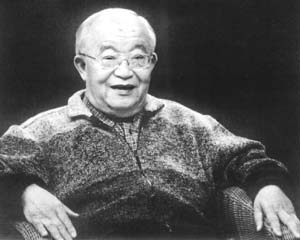 Under the guidance of his father, when still a small boy, Qiao was able to identify 3,000 characters and read the Chinese classics -- such as the Hundred Family Surname, Thousand Character Essay, and Three Character Scripture - very well. Due to his hard work, Qiao gained a deep understanding of the poets with a strict tonal pattern and rhyme scheme, the Yuefu (Han-styled folk songs), and folk ballads of ancient times at a small age, which laid a solid foundation for his later career as a lyric writer. However, he often says that the decades of life experience is his greatest fortune, and that most of his works are inspirations from life.
Under the guidance of his father, when still a small boy, Qiao was able to identify 3,000 characters and read the Chinese classics -- such as the Hundred Family Surname, Thousand Character Essay, and Three Character Scripture - very well. Due to his hard work, Qiao gained a deep understanding of the poets with a strict tonal pattern and rhyme scheme, the Yuefu (Han-styled folk songs), and folk ballads of ancient times at a small age, which laid a solid foundation for his later career as a lyric writer. However, he often says that the decades of life experience is his greatest fortune, and that most of his works are inspirations from life.
Though all his songs are written with his talent and hard work, Qiao has never thought his job as divine and noble, as he often says, "I have never viewed lyrics as good clothes, tasty food, or large and comfortable houses. It is but a homemade meal, coarse clothes, and a small but comfortable courtyard."
In his eyes, the best of his works are those tinted with a touch of the simple real life and the aroma of earth. Some people say Qiao is good with the "rustic style," as his lyrics are easy to understand by the general populace. As to this, Qiao explains he prefers plain and concise lyrics to those with excessive embellishment. In fact, only Qiao knows how hard it is to work out his seemingly simple lyrics.
 Famous first for a Report
Famous first for a Report
 In 1946, while the apricot flowers were blooming, 19-year-old Qiao Yu was force out to quit his studies in Zhongxi Middle School (predecessor of the No. 1 Middle School in Jining) due to poverty and chaos caused by continuous wars. Recommended by the underground workers of the communist party, he entered the Northern University in secret and developed an interest in philosophy, politics, and economics. Soon after, he was sent to the countryside to participate in the land reform in rural areas, and wrote the 120,000-character "Report on Dang'erzhai's Land Reform Experience."
In 1946, while the apricot flowers were blooming, 19-year-old Qiao Yu was force out to quit his studies in Zhongxi Middle School (predecessor of the No. 1 Middle School in Jining) due to poverty and chaos caused by continuous wars. Recommended by the underground workers of the communist party, he entered the Northern University in secret and developed an interest in philosophy, politics, and economics. Soon after, he was sent to the countryside to participate in the land reform in rural areas, and wrote the 120,000-character "Report on Dang'erzhai's Land Reform Experience."
The commander of the land reform regiment, greatly appreciative of the well-written report with clear viewpoints and rigorous logic, ordered the transfer of Qiao to the Policy Research Institute in North China's Hebei Province. The commander's order, however, was not realized because of an order from the Central Committee of the CPC that "none of the students are preserved for post-liberation use and hence should not be transferred or moved." His report was reprinted in the then Ji Nan Daily, greatly promoting the land reform at that time, and the then 20-yer-old Qiao thus became famous.
